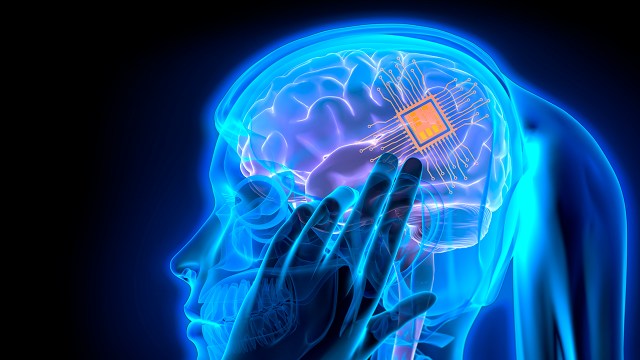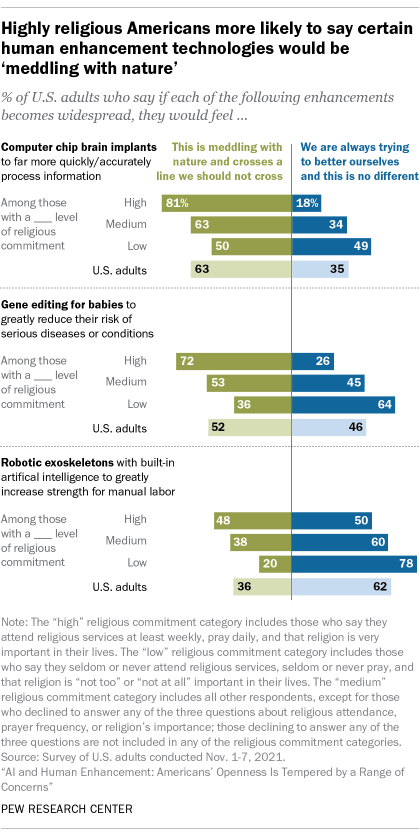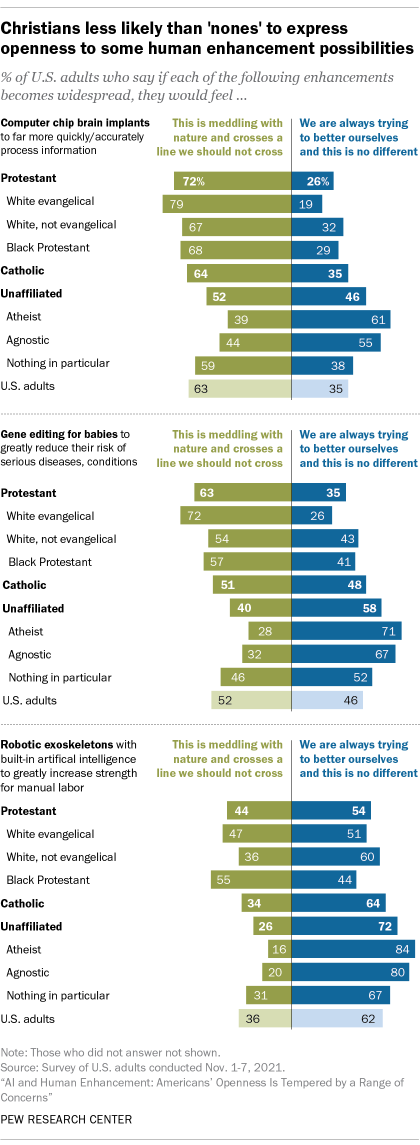
Humanity may be on the cusp of a variety of innovations – including brain chip implants, gene editing and exoskeletons – that could allow people to dramatically enhance human health and abilities. But many Americans, especially those who are highly religious and identify with certain Christian traditions, express discomfort with these possibilities, according to a recent Pew Research Center report.
Pew Research Center conducted this analysis to understand how Americans’ views about human enhancement technologies vary by religion. The analysis is based on a November 2021 survey of 10,260 U.S. adults, including 5,107 who answered the questions analyzed in this blog post.
The Center posed a series of questions about three potential avenues for human enhancement, and asked respondents to state whether a given technology is “meddling with nature and crosses a line we should not cross” or whether “we are always trying to better ourselves and this idea is no different.” The survey asked about:
- Robotic exoskeletons with built-in AI computer systems to help guide the device, making it possible to greatly increase a person’s strength and ability to lift heavy objects for manual labor jobs such as manufacturing or construction.
- Gene editing (changing the DNA of embryos before a baby is born) to greatly reduce a baby’s risk of developing serious diseases or health conditions over their lifetime.
- Computer chips surgically implanted in the brain, making it possible to far more quickly and accurately process information.
Religious commitment is measured on a three-item index based on the importance of religion in respondents’ lives and their self-reported frequency of religious service attendance and prayer.
The “high” religious commitment category includes those who say they attend religious services at least weekly, pray daily, and that religion is very important in their lives. The “low” religious commitment category includes those who say they seldom or never attend religious services, seldom or never pray, and that religion is “not too” or “not at all” important in their lives. The “medium” religious commitment category includes all other respondents, except for those who declined to answer any of the three questions about religious attendance, prayer frequency, or religion’s importance. Those declining to answer any of the three questions are not included in any of the religious commitment categories. Using this classification, 18% of the survey respondents fall into the “high” religious commitment category, 56% are “medium” in religiosity and 25% are “low.”
Everyone who took part in the survey is a member of the Center’s American Trends Panel (ATP), an online survey panel that is recruited through national, random sampling of residential addresses. This way, nearly all U.S. adults have a chance of selection. The survey is weighted to be representative of the U.S. adult population by gender, race, ethnicity, partisan affiliation, education and other categories.
Read more about the ATP’s methodology.
Here are the questions used for this analysis, along with responses, and its methodology.

Among U.S. adults with a high level of religious commitment, 81% say that the widespread use of computer chip brain implants for faster and more accurate information processing would be “meddling with nature and crosses a line we should not cross.” In contrast, Americans with a low level of religious commitment are evenly divided on this question: 50% say that brain chip implants cross a line that should not be crossed, and 49% more closely identify with the notion that “we are always trying to better ourselves and this idea is no different.”
(In this study, levels of religious commitment are based on a three-item index reflecting the importance of religion in a respondent’s life, their frequency of religious service attendance and their frequency of prayer.)
When it comes to the widespread use of gene editing for babies to greatly reduce their risk of serious diseases or conditions, highly religious Americans again are much more likely to say that this technology crosses the line (72%) than to say it’s just another form of human betterment (26%). Among U.S. adults with low religious commitment, on the other hand, acceptance is far more common than caution; almost two-thirds (64%) say that “we are always trying to better ourselves” and that gene editing to enhance babies’ health is no different.
Another question did not elicit the same level of skepticism, although highly religious Americans still were at the more cautious end of the scale. When asked how they would feel about the widespread use of robotic exoskeletons with built-in artificial intelligence to greatly increase strength for manual labor, 48% of highly religious Americans say this would be “meddling with nature and crosses a line we should not cross” and 50% say “we are always trying to better ourselves and this idea is no different.” In contrast, a large majority of adults with a low level of religious commitment (78%) indicate that robotic exoskeletons to enhance strength would be a positive development.

The vast majority of highly religious Americans are Christians, and some Christian subgroups are more likely than others to express reservations about the potential future human enhancement technologies that were mentioned in the survey – at least when asked whether certain technologies are a form of meddling with nature or whether they are an acceptable form of betterment.
In particular, White evangelical Protestants are more skeptical than other groups when asked about the potential use of brain implants and gene editing to change human abilities. Roughly eight-in-ten White evangelicals (79%) say that widespread chip implants in the brain would constitute unacceptable meddling with nature, compared with about two-thirds of White non-evangelical Protestants, Black Protestants and Catholics who take this view.
(The survey was conducted among Americans of all religious backgrounds, including Jews, Muslims, Buddhists and Hindus, but it did not obtain enough respondents from non-Christian groups to report separately on their responses. Small subgroups of Christians could not be analyzed separately for the same reason.)
Similarly, roughly seven-in-ten White evangelicals (72%) say the widespread use of gene editing for babies to reduce their risk of serious diseases or conditions is meddling with nature, compared with 57% of Black Protestants, 54% of White non-evangelical Protestants, and 51% of Catholics who agree with this statement.
When it comes to the question about exoskeletons with built-in artificial intelligence to greatly enhance human strength for manual labor, Black Protestants and White evangelical Protestants are the most likely to express reservations. About half of Black Protestants (55%) and White evangelicals (47%) say the use of exoskeletons to greatly enhance human strength for manual labor would cross a line that should not be crossed.
Across all three questions, religiously unaffiliated people – who are also known as “nones” and are made up of those who describe their religious identity as atheist, agnostic, or “nothing in particular” – are more accepting than Christians of the potential use of these developing technologies. Almost half of “nones” (46%) say the widespread use of brain implants to enhance cognitive processing would be a form of betterment that’s no different from other innovations, while majorities in this group say the same about using gene editing to reduce babies’ risk of serious diseases or conditions (58%) and utilizing robotic exoskeletons with built-in AI to increase strength (72%). “Nones” who identify as atheist or agnostic are especially open to these developments; atheists are the only religious group in this analysis who are significantly more likely to view each of the proposed innovations more positively than negatively.
Note: Here are the questions used for this analysis, along with responses, and its methodology.